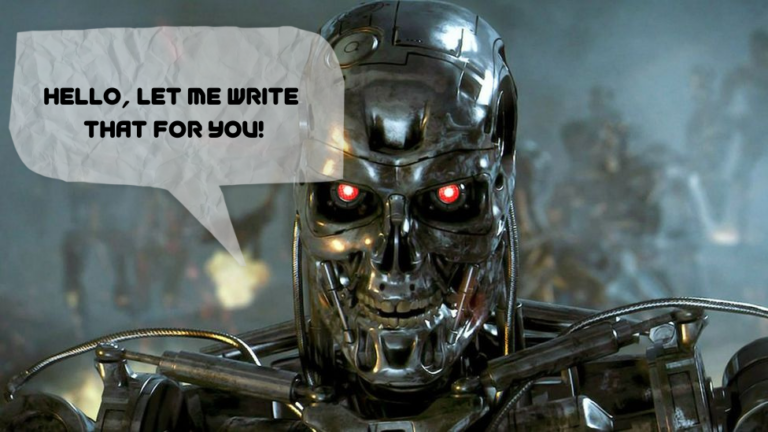Artificial Intelligence (AI) has long been hyped as a game-changing technology that will forever alter the way people operate. Tesla first released its “full” self-driving capability in 2016, although infrastructure, regulation and human behaviour continue to present a barrier to full adoption – it’s looking like it’ll be a while longer until we can kick back and relax whilst our cars whizz us around the roads.
However, with the recent release of ChatGPT some of the exciting possibilities of a world powered by AI are starting to become apparent.
Many users are finding that they now have a new and powerful tool at their disposal, one tool that many in the digital marketing space are talking about is content creation. Before you fire your team of content curators make sure you read through our list of pros and cons to using tools like ChatGPT to power your content creation efforts.
Advantages of using ChatGPT for Content Creation
- Efficiency and Speed – ChatGPT and other AI tools can quickly generate large amounts of content in a fraction of the time it would take a human to do so. This is particularly useful for organisations that need to create a lot of content in a short amount of time, such as during a busy marketing campaign.
- Customization and Personalization – ChatGPT can be programmed to generate content based on specific parameters, such as target audience, tone, and style. This allows organisations to create content that is customized and personalized to their target audience, which can help to improve engagement and conversions.
- Cost-Effective – Hiring a team of writers, editors, and proofreaders can be expensive. By using ChatGPT, businesses can significantly reduce their content creation costs, as AI tools do not require salaries, benefits, or time off.
- Improved Consistency – ChatGPT can be programmed to generate content that is consistent with a brand’s tone and style, which can help to improve the overall quality and effectiveness of marketing campaigns. Although many skilled copywriters will be more than adept at doing this.
- It’s learning and improving quickly – despite some of the drawbacks of the current models (see below for more information) the tool is learning and improving its output at a rapid pace. For example, a recent study to see if ChatGPT could pass the United States Medical Licencing Exam (USMLE) saw ChatGPT’s average score increase from 36.7 % to 52.4-75% in a matter of months!
Chat to a Ninja (not an AI) about your marketing requirements
The Ninjas are ready and waiting to help you with your digital marketing questions and challenges – just hit the button to get in touch
Disadvantages of using ChatGPT for Content Creation
- Lack of Creativity – Despite its ability to generate large amounts of content quickly, ChatGPT and other AI tools can struggle with creativity. The content generated by these tools is often formulaic and lacks the unique perspective and insights that human writers can bring to the table.
- Limited Understanding of Context – ChatGPT and other AI tools are limited by the data they have been trained on. This means that they may not fully understand the context and meaning behind the content they generate, which can lead to errors and inaccuracies. Indeed there have been many reports of ChatGPT simply making up facts. This article discusses how Google’s new AI chatbot got something very publicly wrong.
- Potential for Bias – AI tools like ChatGPT are trained on large datasets, which can contain biases and inaccuracies. This can lead to the generation of content that is not representative of the target audience or that perpetuates harmful stereotypes. Remember, most of the content that’s out there at the moment was created by humans with their own biases and imperfections, this is the dataset that tools like ChatGPT are learning from.
- Difficulty in Measuring Success – Unlike human writers, ChatGPT and other AI tools do not have the ability to evaluate the success of the content they generate. Perhaps this will change as marketing analytics data starts to be fed back into the tools.
- Content Dump – if everybody starts pumping out content using automatic tools, do we end up getting to a point where we start to lose differentiation or at least control of that differentiation? Ultimately leading to a homogenisation of marketing creativity. We don’t know the answer to this but it certainly feels like a risk.
Should I use ChatGPT For My Marketing Content?
Our view is that ChatGPT can be a valuable asset for organisations looking to create content for marketing campaigns. However, at this stage, fact-checking alone is argument enough for human writers to be heavily involved in the process.
To get the most out of ChatGPT and other AI content-generation tools, organisations should consider using a combination of human and AI-generated content. This can help to strike a balance between efficiency, creativity, and accuracy, and to ensure that marketing campaigns are effective and impactful. An example use case for this would be using ChatGPT to create basic article outlines and structures, potentially adding in rich content/examples where needed – with the human editor bringing everything together.
One thing is for certain, we’re going to start seeing more and more AI-powered services. Microsoft recently announced that they’re rolling out ChatGPT integration to their often maligned search engine, Bing.com. Could this turn the tide in Microsoft’s favour in the battle for search dominance? Only time will tell. See preview of Bing + ChatGPT below:











